Fleurs du Mal Magazine


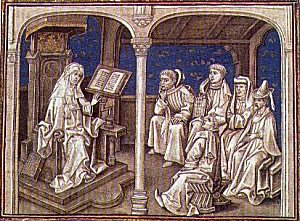
Christine de Pisan
(ca. 1364-1430)
Trés doulce dame, or suis je revenu
Trés doulce dame, or suis je revenu
Prest d’obeïr, s’il vous plait commander,
Comme vo serf vous me pouez mander.
J’ay longuement esté de joye nu
Hors du paÿs, mais, pour tout amender,
Trés doulce dame, or suis je revenu.
Mais je ne sçay s’il vous est souvenu
De moy qui vueil vous servir sanz tarder,
Et en espoir de vo grace garder,
Trés doulce dame, or suis je revenu.
Christine de Pisan poetry
kempis.nl poetry magazine
More in: Archive O-P, Pisan, Christine de
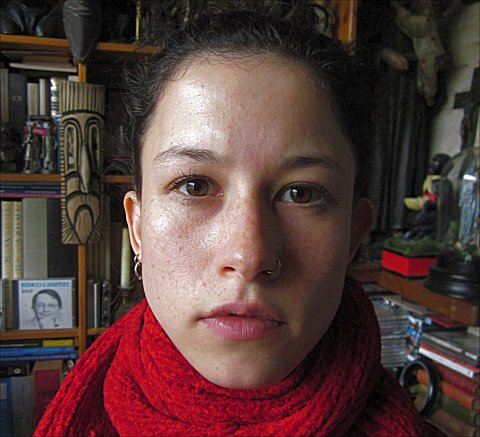
photo jef van kempen
Esther Porcelijn
Te vroeg voor chips
Het gaat zo beginnen, het is bijna op!
Zou iemand komen vertellen over slagschepen
Over hoe we met problemen dwepen?
Over wartaal, dansen en een mop?
Of over crème-bruléé of taartbak-tips!
‘t Is niet dat ik daar zin in heb hoor
Zegt Lidy tegen haar man, Theodoor.
Maar het is te laat voor muesli en te vroeg voor chips.
Het is rustig in de rest van het huis
De kat krabt aan een paal
Iedereen wacht op het verhaal
Van een man en zijn circusmuis
“Wat jij schat?” port Lidy aan
“Wat is het dat jij wil horen”
Hmm. Iets over dat Ajax heeft verloren.
Of het verliezen van een baan.
Ach lieverd, boeiend hoor!
maar dat komt morgen misschien
Nu gaat het over hoe mensen kunst zien
En ik hoef pas later naar kantoor!
De telefoon gaat. Lidy wiebelt even
Hé nu liever niet, geen crisis geen zin
Geen oplossingen, geen spanning in ’t gezin
Geen werk, daar is niets te beleven
Theodoor slaat een arm om haar heen
Legt zijn andere hand op haar been.
Boze telefoontjes moeten wachten
Ook de zee golft even niet, en geen van de natuurkrachten
Ik kan nu niet komen delegeren, tot mijn spijt
De wasmachine heeft geen toeren
De bouwvakkers staken het loeren
De AEX staat stil, want ja, koffietijd!
Op 7 Maart 2013 was Esther Porcelijn te gast bij het programma Koffietijd op RTL4 naar aanleiding van het winnen van de Hollands Maandblad aanmoedigingsprijs voor poëzie. Na een kort interview droeg zij een speciaal voor koffietijd geschreven gedicht voor.
Esther Porcelijn poetry
kempis.nl poetry magazine
More in: Porcelijn, Esther, Porcelijn, Esther
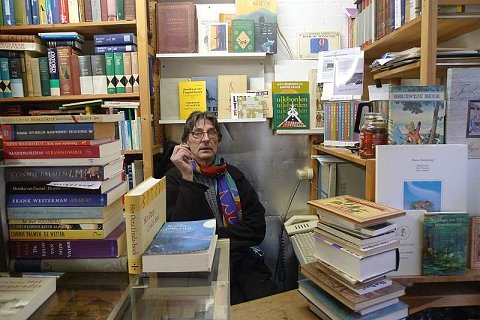


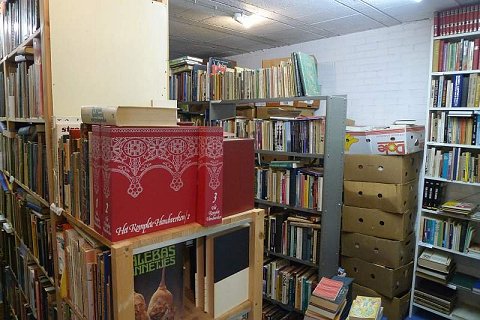
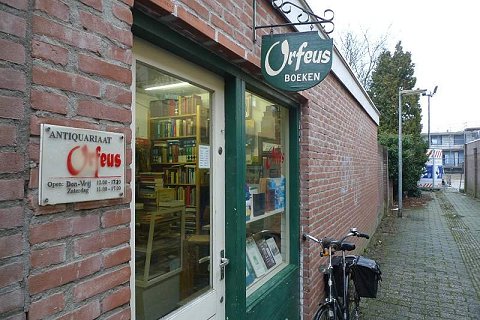
Joep Eijkens
Orpheus leeft nog
Hoe vaak is het de laatste jaren al niet gebeurd dat je aan een definitief gesloten deur kwam waar je een antiquariaat verwachtte? Steeds meer tweedehandsboekhandelaren leggen het loodje of gaan uitsluitend nog op internet verder. Maar er zijn volhouders en één van hen heet Adrie Krijgsman. Hij runt al jaren een bescheiden antiquariaat in Assen. Het zaakje, gelegen aan een nogal verlopen winkelsteegje, is genoemd naar Orpheus, de beroemde zanger en dichter uit de Griekse mythologie die zo gruwelijk aan zijn eind kwam.
Ik kom er niet vaak, hooguit vier keer per jaar. Afgelopen weekend was ik er weer. “Hoe gaat het?”vroeg ik Adrie. “Met mij gaat het goed”, antwoordde hij, “Maar met de zaken…” Goed, hij was nog niet gestopt zoals zijn collega’s aan de Roldestraat.” Maar ik heb ook een lagere huur.” Het was het bekende verhaal: teveel concurrentie van een toenemend aantal aanbieders, van particulieren tot kringloopbedrijven. “Wist je dat in Assen alleen al een stuk of zeven kringloopbedrijven zitten?”
Niettemin hield hij hoop: misschien zou hij wat meer aanloop krijgen als het nabijgelegen nieuwe winkelcentrum openging.
Toen ik aanstalten maakte om te vertrekken – ik had helaas niets van mijn gading gevonden – bood hij me opeens een boekje aan. Een boekje van eigen hand. Zijn zesde gedichtenbundel, schraal grondgebied getiteld. In het Nieuwsblad van het Noorden kreeg de bundel een goede recensie, vertelde hij. “Drie sterren.” Of ik er ook aandacht aan zou kunnen besteden?
Thuis door het hoekje bladerend valt mijn oog op het gedicht bij lege winkel. Dat gaat zo:
bij lege winkel
staat
vanaf de stille straat
in een verscholen hoek
nog steeds haar damesfiets
met loshangend slot
donkergroen frame
een weggeworpen blikje
tegen de voorband
herfstbladeren
koude mist
zuigt in de middag
novemberlicht weg
langs kusten van roze graniet
vliegen onverstoorbare meeuwen
valt al de eerste sneeuw
Het zou me niet verbazen dat de dichter zijn inspiratie in zijn eigen steegje heeft gevonden, wie weet kijkend naar de grauwe hemel boven Assen even wegdromend naar een vakantie in Bretagne…
Het mooi sober vormgegeven boekje kwam uit in een oplage van 50 exemplaren en is verkrijgbaar via www.adriekrijgsman.nl
Photos & text© Joep Eijkens
fleursdumal.nl magazine
More in: - Bookstores, Joep Eijkens, Joep Eijkens Photos

Henry Bataille
(1872-1922)
Le passé, c’est un second coeur qui bat en nous . . .
Le passé, c’est un second coeur qui bat en nous…
on l’entend, dans nos chairs, rythmer à petits coups,
sa cadence, pareille à l’autre coeur, -plus loin,
l’espace est imprécis où ce coeur a sa place,
mais on l’entend, comme un grand écho, néanmoins,
alimenter le fond de l’être et sa surface.
Il bat. Quand le silence en nous se fait plus fort
cette pulsation mystérieuse est là
qui continue… Et quand on rêve il bat encor,
et quand on souffre il bat, et quand on aime il bat…
Toujours ! C’est un prolongement de notre vie…
Mais si vous recherchez, pour y porter la main,
où peut être la source heureuse et l’eurythmie
de son effluve… Rien !… Vous ne trouverez rien
sous les doigts… Il échappe. Illusion… Personne
ne l’a trouvé jamais… Il faut nous contenter
d’en sentir, à coups sourds, l’élan précipité,
dans les soirs trop humains où ce grand coeur résonne.
Le passé! Quel mot vain! C’est du présent -très flou,
c’est du présent de second plan, et voilà tout.
Il n’est pas vrai que rien jamais soit effacé.
Le passé n’est jamais tout à fait le passé.
N’avez-vous pas senti comme il rôde partout,
et tangible ? Il est là, lucide, clairvoyant,
non pas derrière nous, comme on croit, mais devant.
L’ombre de ce qui fut devant nous se projette
sur le chemin qui va, sur l’acte qui s’éveille.
Ce qui est mort est encor là qui nous précède, –
comme le soir on voit, au coucher du soleil,
les formes qu’on avait peu à peu dépassées
envoyer leur grande ombre au loin, sur les allées,
sur tout votre avenir, plaines, taillis, campagnes !
Et s’en aller toucher de l’aile les montagnes…
Ainsi, tout ce qui fut, jeunesse, enfance, amour,
tout danse devant moi sa danse heureuse ou triste.
Rien derrière !… Le groupe est là qui vole et court.
Mais j’ai beau me hâter, la distance persiste
entre nous deux… Tel je m’en vais, épris du bleu
lointain, et quelquefois si je titube un peu
ce n’est pas que le sol sous mes pas se dérobe,
c’est que parmi le soir, les yeux plein de passé,
ô toi qui vas devant, Souvenir cadencé,
j’ai marché sur la traîne immense de ta robe !
Henry Bataille poetry
kempis.nl poetry magazine
More in: Archive A-B, Bataille, Henry
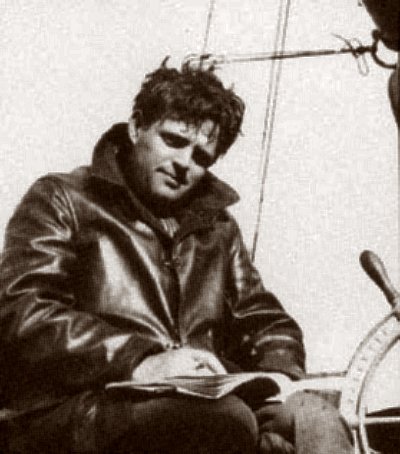
Jack London
(1876-1916)
The Tears of Ah Kim
There was a great noise and racket, but no scandal, in Honolulu’s
Chinatown. Those within hearing distance merely shrugged their
shoulders and smiled tolerantly at the disturbance as an affair of
accustomed usualness. “What is it?” asked Chin Mo, down with a
sharp pleurisy, of his wife, who had paused for a second at the
open window to listen.
“Only Ah Kim,” was her reply. “His mother is beating him again.”
The fracas was taking place in the garden, behind the living rooms
that were at the back of the store that fronted on the street with
the proud sign above: AH KIM COMPANY, GENERAL MERCHANDISE. The
garden was a miniature domain, twenty feet square, that somehow
cunningly seduced the eye into a sense and seeming of illimitable
vastness. There were forests of dwarf pines and oaks, centuries
old yet two or three feet in height, and imported at enormous care
and expense. A tiny bridge, a pace across, arched over a miniature
river that flowed with rapids and cataracts from a miniature lake
stocked with myriad-finned, orange-miracled goldfish that in
proportion to the lake and landscape were whales. On every side
the many windows of the several-storied shack-buildings looked
down. In the centre of the garden, on the narrow gravelled walk
close beside the lake Ah Kim was noisily receiving his beating.
No Chinese lad of tender and beatable years was Ah Kim. His was
the store of Ah Kim Company, and his was the achievement of
building it up through the long years from the shoestring of
savings of a contract coolie labourer to a bank account in four
figures and a credit that was gilt edged. An even half-century of
summers and winters had passed over his head, and, in the passing,
fattened him comfortably and snugly. Short of stature, his full
front was as rotund as a water-melon seed. His face was moon-
faced. His garb was dignified and silken, and his black-silk
skull-cap with the red button atop, now, alas! fallen on the
ground, was the skull-cap worn by the successful and dignified
merchants of his race.
But his appearance, in this moment of the present, was anything but
dignified. Dodging and ducking under a rain of blows from a bamboo
cane, he was crouched over in a half-doubled posture. When he was
rapped on the knuckles and elbows, with which he shielded his face
and head, his winces were genuine and involuntary. From the many
surrounding windows the neighbourhood looked down with placid
enjoyment.
And she who wielded the stick so shrewdly from long practice!
Seventy-four years old, she looked every minute of her time. Her
thin legs were encased in straight-lined pants of linen stiff-
textured and shiny-black. Her scraggly grey hair was drawn
unrelentingly and flatly back from a narrow, unrelenting forehead.
Eyebrows she had none, having long since shed them. Her eyes, of
pin-hole tininess, were blackest black. She was shockingly
cadaverous. Her shrivelled forearm, exposed by the loose sleeve,
possessed no more of muscle than several taut bowstrings stretched
across meagre bone under yellow, parchment-like skin. Along this
mummy arm jade bracelets shot up and down and clashed with every
blow.
“Ah!” she cried out, rhythmically accenting her blows in series of
three to each shrill observation. “I forbade you to talk to Li
Faa. To-day you stopped on the street with her. Not an hour ago.
Half an hour by the clock you talked.–What is that?”
“It was the thrice-accursed telephone,” Ah Kim muttered, while she
suspended the stick to catch what he said. “Mrs. Chang Lucy told
you. I know she did. I saw her see me. I shall have the
telephone taken out. It is of the devil.”
“It is a device of all the devils,” Mrs. Tai Fu agreed, taking a
fresh grip on the stick. “Yet shall the telephone remain. I like
to talk with Mrs. Chang Lucy over the telephone.”
“She has the eyes of ten thousand cats,” quoth Ah Kim, ducking and
receiving the stick stinging on his knuckles. “And the tongues of
ten thousand toads,” he supplemented ere his next duck.
“She is an impudent-faced and evil-mannered hussy,” Mrs. Tai Fu
accented.
“Mrs. Chang Lucy was ever that,” Ah Kim murmured like the dutiful
son he was.
“I speak of Li Faa,” his mother corrected with stick emphasis.
“She is only half Chinese, as you know. Her mother was a shameless
kanaka. She wears skirts like the degraded haole women–also
corsets, as I have seen for myself. Where are her children? Yet
has she buried two husbands.”
“The one was drowned, the other kicked by a horse,” Ah Kim
qualified.
“A year of her, unworthy son of a noble father, and you would
gladly be going out to get drowned or be kicked by a horse.”
Subdued chucklings and laughter from the window audience applauded
her point.
“You buried two husbands yourself, revered mother,” Ah Kim was
stung to retort.
“I had the good taste not to marry a third. Besides, my two
husbands died honourably in their beds. They were not kicked by
horses nor drowned at sea. What business is it of our neighbours
that you should inform them I have had two husbands, or ten, or
none? You have made a scandal of me, before all our neighbours,
and for that I shall now give you a real beating.”
Ah Kim endured the staccato rain of blows, and said when his mother
paused, breathless and weary:
“Always have I insisted and pleaded, honourable mother, that you
beat me in the house, with the windows and doors closed tight, and
not in the open street or the garden open behind the house.
“You have called this unthinkable Li Faa the Silvery Moon Blossom,”
Mrs. Tai Fu rejoined, quite illogically and femininely, but with
utmost success in so far as she deflected her son from continuance
of the thrust he had so swiftly driven home.
“Mrs. Chang Lucy told you,” he charged.
“I was told over the telephone,” his mother evaded. “I do not know
all voices that speak to me over that contrivance of all the
devils.”
Strangely, Ah Kim made no effort to run away from his mother, which
he could easily have done. She, on the other hand, found fresh
cause for more stick blows.
“Ah! Stubborn one! Why do you not cry? Mule that shameth its
ancestors! Never have I made you cry. From the time you were a
little boy I have never made you cry. Answer me! Why do you not
cry?”
Weak and breathless from her exertions, she dropped the stick and
panted and shook as if with a nervous palsy.
“I do not know, except that it is my way,” Ah Kim replied, gazing
solicitously at his mother. “I shall bring you a chair now, and
you will sit down and rest and feel better.”
But she flung away from him with a snort and tottered agedly across
the garden into the house. Meanwhile recovering his skull-cap and
smoothing his disordered attire, Ah Kim rubbed his hurts and gazed
after her with eyes of devotion. He even smiled, and almost might
it appear that he had enjoyed the beating.
Ah Kim had been so beaten ever since he was a boy, when he lived on
the high banks of the eleventh cataract of the Yangtse river. Here
his father had been born and toiled all his days from young manhood
as a towing coolie. When he died, Ah Kim, in his own young
manhood, took up the same honourable profession. Farther back than
all remembered annals of the family, had the males of it been
towing coolies. At the time of Christ his direct ancestors had
been doing the same thing, meeting the precisely similarly modelled
junks below the white water at the foot of the canyon, bending the
half-mile of rope to each junk, and, according to size, tailing on
from a hundred to two hundred coolies of them and by sheer, two-
legged man-power, bowed forward and down till their hands touched
the ground and their faces were sometimes within a foot of it,
dragging the junk up through the white water to the head of the
canyon.
Apparently, down all the intervening centuries, the payment of the
trade had not picked up. His father, his father’s father, and
himself, Ah Kim, had received the same invariable remuneration–per
junk one-fourteenth of a cent, at the rate he had since learned
money was valued in Hawaii. On long lucky summer days when the
waters were easy, the junks many, the hours of daylight sixteen,
sixteen hours of such heroic toil would earn over a cent. But in a
whole year a towing coolie did not earn more than a dollar and a
half. People could and did live on such an income. There were
women servants who received a yearly wage of a dollar. The net-
makers of Ti Wi earned between a dollar and two dollars a year.
They lived on such wages, or, at least, they did not die on them.
But for the towing coolies there were pickings, which were what
made the profession honourable and the guild a close and hereditary
corporation or labour union. One junk in five that was dragged up
through the rapids or lowered down was wrecked. One junk in every
ten was a total loss. The coolies of the towing guild knew the
freaks and whims of the currents, and grappled, and raked, and
netted a wet harvest from the river. They of the guild were looked
up to by lesser coolies, for they could afford to drink brick tea
and eat number four rice every day.
And Ah Kim had been contented and proud, until, one bitter spring
day of driving sleet and hail, he dragged ashore a drowning
Cantonese sailor. It was this wanderer, thawing out by his fire,
who first named the magic name Hawaii to him. He had himself never
been to that labourer’s paradise, said the sailor; but many Chinese
had gone there from Canton, and he had heard the talk of their
letters written back. In Hawaii was never frost nor famine. The
very pigs, never fed, were ever fat of the generous offal disdained
by man. A Cantonese or Yangtse family could live on the waste of
an Hawaii coolie. And wages! In gold dollars, ten a month, or, in
trade dollars, two a month, was what the contract Chinese coolie
received from the white-devil sugar kings. In a year the coolie
received the prodigious sum of two hundred and forty trade dollars-
-more than a hundred times what a coolie, toiling ten times as
hard, received on the eleventh cataract of the Yangtse. In short,
all things considered, an Hawaii coolie was one hundred times
better off, and, when the amount of labour was estimated, a
thousand times better off. In addition was the wonderful climate.
When Ah Kim was twenty-four, despite his mother’s pleadings and
beatings, he resigned from the ancient and honourable guild of the
eleventh cataract towing coolies, left his mother to go into a boss
coolie’s household as a servant for a dollar a year, and an annual
dress to cost not less than thirty cents, and himself departed down
the Yangtse to the great sea. Many were his adventures and severe
his toils and hardships ere, as a salt-sea junk-sailor, he won to
Canton. When he was twenty-six he signed five years of his life
and labour away to the Hawaii sugar kings and departed, one of
eight hundred contract coolies, for that far island land, on a
festering steamer run by a crazy captain and drunken officers and
rejected of Lloyds.
Honourable, among labourers, had Ah Kim’s rating been as a towing
coolie. In Hawaii, receiving a hundred times more pay, he found
himself looked down upon as the lowest of the low–a plantation
coolie, than which could be nothing lower. But a coolie whose
ancestors had towed junks up the eleventh cataract of the Yangtse
since before the birth of Christ inevitably inherits one character
in large degree, namely, the character of patience. This patience
was Ah Kim’s. At the end of five years, his compulsory servitude
over, thin as ever in body, in bank account he lacked just ten
trade dollars of possessing a thousand trade dollars.
On this sum he could have gone back to the Yangtse and retired for
life a really wealthy man. He would have possessed a larger sum,
had he not, on occasion, conservatively played che fa and fan tan,
and had he not, for a twelve-month, toiled among the centipedes and
scorpions of the stifling cane-fields in the semi-dream of a
continuous opium debauch. Why he had not toiled the whole five
years under the spell of opium was the expensiveness of the habit.
He had had no moral scruples. The drug had cost too much.
But Ah Kim did not return to China. He had observed the business
life of Hawaii and developed a vaulting ambition. For six months,
in order to learn business and English at the bottom, he clerked in
the plantation store. At the end of this time he knew more about
that particular store than did ever plantation manager know about
any plantation store. When he resigned his position he was
receiving forty gold a month, or eighty trade, and he was beginning
to put on flesh. Also, his attitude toward mere contract coolies
had become distinctively aristocratic. The manager offered to
raise him to sixty fold, which, by the year, would constitute a
fabulous fourteen hundred and forty trade, or seven hundred times
his annual earning on the Yangtse as a two-legged horse at one-
fourteenth of a gold cent per junk.
Instead of accepting, Ah Kim departed to Honolulu, and in the big
general merchandise store of Fong & Chow Fong began at the bottom
for fifteen gold per month. He worked a year and a half, and
resigned when he was thirty-three, despite the seventy-five gold
per month his Chinese employers were paying him. Then it was that
he put up his own sign: AH KIM COMPANY, GENERAL MERCHANDISE.
Also, better fed, there was about his less meagre figure a
foreshadowing of the melon-seed rotundity that was to attach to him
in future years.
With the years he prospered increasingly, so that, when he was
thirty-six, the promise of his figure was fulfilling rapidly, and,
himself a member of the exclusive and powerful Hai Gum Tong, and of
the Chinese Merchants’ Association, he was accustomed to sitting as
host at dinners that cost him as much as thirty years of towing on
the eleventh cataract would have earned him. Two things he missed:
a wife, and his mother to lay the stick on him as of yore.
When he was thirty-seven he consulted his bank balance. It stood
him three thousand gold. For twenty-five hundred down and an easy
mortgage he could buy the three-story shack-building, and the
ground in fee simple on which it stood. But to do this, left only
five hundred for a wife. Fu Yee Po had a marriageable, properly
small-footed daughter whom he was willing to import from China, and
sell to him for eight hundred gold, plus the costs of importation.
Further, Fu Yee Po was even willing to take five hundred down and
the remainder on note at 6 per cent.
Ah Kim, thirty-seven years of age, fat and a bachelor, really did
want a wife, especially a small-footed wife; for, China born and
reared, the immemorial small-footed female had been deeply
impressed into his fantasy of woman. But more, even more and far
more than a small-footed wife, did he want his mother and his
mother’s delectable beatings. So he declined Fu Yee Po’s easy
terms, and at much less cost imported his own mother from servant
in a boss coolie’s house at a yearly wage of a dollar and a thirty-
cent dress to be mistress of his Honolulu three-story shack
building with two household servants, three clerks, and a porter of
all work under her, to say nothing of ten thousand dollars’ worth
of dress goods on the shelves that ranged from the cheapest cotton
crepes to the most expensive hand-embroidered silks. For be it
known that even in that early day Ah Kim’s emporium was beginning
to cater to the tourist trade from the States.
For thirteen years Ah Kim had lived tolerably happily with his
mother, and by her been methodically beaten for causes just or
unjust, real or fancied; and at the end of it all he knew as
strongly as ever the ache of his heart and head for a wife, and of
his loins for sons to live after him, and carry on the dynasty of
Ah Kim Company. Such the dream that has ever vexed men, from those
early ones who first usurped a hunting right, monopolized a sandbar
for a fish-trap, or stormed a village and put the males thereof to
the sword. Kings, millionaires, and Chinese merchants of Honolulu
have this in common, despite that they may praise God for having
made them differently and in self-likable images.
And the ideal of woman that Ah Kim at fifty ached for had changed
from his ideal at thirty-seven. No small-footed wife did he want
now, but a free, natural, out-stepping normal-footed woman that,
somehow, appeared to him in his day dreams and haunted his night
visions in the form of Li Faa, the Silvery Moon Blossom. What if
she were twice widowed, the daughter of a kanaka mother, the wearer
of white-devil skirts and corsets and high-heeled slippers! He
wanted her. It seemed it was written that she should be joint
ancestor with him of the line that would continue the ownership and
management through the generations, of Ah Kim Company, General
Merchandise.
“I will have no half-pake daughter-in-law,” his mother often
reiterated to Ah Kim, pake being the Hawaiian word for Chinese.
“All pake must my daughter-in-law be, even as you, my son, and as
I, your mother. And she must wear trousers, my son, as all the
women of our family before her. No woman, in she-devil skirts and
corsets, can pay due reverence to our ancestors. Corsets and
reverence do not go together. Such a one is this shameless Li Faa.
She is impudent and independent, and will be neither obedient to
her husband nor her husband’s mother. This brazen-faced Li Faa
would believe herself the source of life and the first ancestor,
recognizing no ancestors before her. She laughs at our joss-
sticks, and paper prayers, and family gods, as I have been well
told–“
“Mrs. Chang Lucy,” Ah Kim groaned.
“Not alone Mrs. Chang Lucy, O son. I have inquired. At least a
dozen have heard her say of our joss house that it is all monkey
foolishness. The words are hers–she, who eats raw fish, raw
squid, and baked dog. Ours is the foolishness of monkeys. Yet
would she marry you, a monkey, because of your store that is a
palace and of the wealth that makes you a great man. And she would
put shame on me, and on your father before you long honourably
dead.”
And there was no discussing the matter. As things were, Ah Kim
knew his mother was right. Not for nothing had Li Faa been born
forty years before of a Chinese father, renegade to all tradition,
and of a kanaka mother whose immediate forebears had broken the
taboos, cast down their own Polynesian gods, and weak-heartedly
listened to the preaching about the remote and unimageable god of
the Christian missionaries. Li Faa, educated, who could read and
write English and Hawaiian and a fair measure of Chinese, claimed
to believe in nothing, although in her secret heart she feared the
kahunas (Hawaiian witch-doctors), who she was certain could charm
away ill luck or pray one to death. Li Faa would never come into
Ah Kim’s house, as he thoroughly knew, and kow-tow to his mother
and be slave to her in the immemorial Chinese way. Li Faa, from
the Chinese angle, was a new woman, a feminist, who rode horseback
astride, disported immodestly garbed at Waikiki on the surf-boards,
and at more than one luau (feast) had been known to dance the hula
with the worst and in excess of the worst, to the scandalous
delight of all.
Ah Kim himself, a generation younger than his mother, had been
bitten by the acid of modernity. The old order held, in so far as
he still felt in his subtlest crypts of being the dusty hand of the
past resting on him, residing in him; yet he subscribed to heavy
policies of fire and life insurance, acted as treasurer for the
local Chinese revolutionises that were for turning the Celestial
Empire into a republic, contributed to the funds of the Hawaii-born
Chinese baseball nine that excelled the Yankee nines at their own
game, talked theosophy with Katso Suguri, the Japanese Buddhist and
silk importer, fell for police graft, played and paid his insidious
share in the democratic politics of annexed Hawaii, and was
thinking of buying an automobile. Ah Kim never dared bare himself
to himself and thrash out and winnow out how much of the old he had
ceased to believe in. His mother was of the old, yet he revered
her and was happy under her bamboo stick. Li Faa, the Silvery Moon
Blossom, was of the new, yet he could never be quite completely
happy without her.
For he loved Li Faa. Moon-faced, rotund as a water-melon seed,
canny business man, wise with half a century of living–
nevertheless Ah Kim became an artist when he thought of her. He
thought of her in poems of names, as woman transmuted into flower-
terms of beauty and philosophic abstractions of achievement and
easement. She was, to him, and alone to him of all men in the
world, his Plum Blossom, his Tranquillity of Woman, his Flower of
Serenity, his Moon Lily, and his Perfect Rest. And as he murmured
these love endearments of namings, it seemed to him that in them
were the ripplings of running waters, the tinklings of silver wind-
bells, and the scents of the oleander and the jasmine. She was his
poem of woman, a lyric delight, a three-dimensions of flesh and
spirit delicious, a fate and a good fortune written, ere the first
man and woman were, by the gods whose whim had been to make all men
and women for sorrow and for joy.
But his mother put into his hand the ink-brush and placed under it,
on the table, the writing tablet.
“Paint,” said she, “the ideograph of TO MARRY.”
He obeyed, scarcely wondering, with the deft artistry of his race
and training painting the symbolic hieroglyphic.
“Resolve it,” commanded his mother.
Ah Kim looked at her, curious, willing to please, unaware of the
drift of her intent.
“Of what is it composed?” she persisted. “What are the three
originals, the sum of which is it: to marry, marriage, the coming
together and wedding of a man and a woman? Paint them, paint them
apart, the three originals, unrelated, so that we may know how the
wise men of old wisely built up the ideograph of to marry.”
And Ah Kim, obeying and painting, saw that what he had painted were
three picture-signs–the picture-signs of a hand, an ear, and a
woman.
“Name them,” said his mother; and he named them.
“It is true,” said she. “It is a great tale. It is the stuff of
the painted pictures of marriage. Such marriage was in the
beginning; such shall it always be in my house. The hand of the
man takes the woman’s ear, and by it leads her away to his house,
where she is to be obedient to him and to his mother. I was taken
by the ear, so, by your long honourably dead father. I have looked
at your hand. It is not like his hand. Also have I looked at the
ear of Li Faa. Never will you lead her by the ear. She has not
that kind of an ear. I shall live a long time yet, and I will be
mistress in my son’s house, after our ancient way, until I die.”
“But she is my revered ancestress,” Ah Kim explained to Li Faa.
He was timidly unhappy; for Li Faa, having ascertained that Mrs.
Tai Fu was at the temple of the Chinese AEsculapius making a food
offering of dried duck and prayers for her declining health, had
taken advantage of the opportunity to call upon him in his store.
Li Faa pursed her insolent, unpainted lips into the form of a half-
opened rosebud, and replied:
“That will do for China. I do not know China. This is Hawaii, and
in Hawaii the customs of all foreigners change.”
“She is nevertheless my ancestress,” Ah Kim protested, “the mother
who gave me birth, whether I am in China or Hawaii, O Silvery Moon
Blossom that I want for wife.”
“I have had two husbands,” Li Faa stated placidly. “One was a
pake, one was a Portuguese. I learned much from both. Also am I
educated. I have been to High School, and I have played the piano
in public. And I learned from my two husbands much. The pake
makes the best husband. Never again will I marry anything but a
pake. But he must not take me by the ear–“
“How do you know of that?” he broke in suspiciously.
“Mrs. Chang Lucy,” was the reply. “Mrs. Chang Lucy tells me
everything that your mother tells her, and your mother tells her
much. So let me tell you that mine is not that kind of an ear.”
“Which is what my honoured mother has told me,” Ah Kim groaned.
“Which is what your honoured mother told Mrs. Chang Lucy, which is
what Mrs. Chang Lucy told me,” Li Faa completed equably. “And I
now tell you, O Third Husband To Be, that the man is not born who
will lead me by the ear. It is not the way in Hawaii. I will go
only hand in hand with my man, side by side, fifty-fifty as is the
haole slang just now. My Portuguese husband thought different. He
tried to beat me. I landed him three times in the police court and
each time he worked out his sentence on the reef. After that he
got drowned.”
“My mother has been my mother for fifty years,” Ah Kim declared
stoutly.
“And for fifty years has she beaten you,” Li Faa giggled. “How my
father used to laugh at Yap Ten Shin! Like you, Yap Ten Shin had
been born in China, and had brought the China customs with him.
His old father was for ever beating him with a stick. He loved his
father. But his father beat him harder than ever when he became a
missionary pake. Every time he went to the missionary services,
his father beat him. And every time the missionary heard of it he
was harsh in his language to Yap Ten Shin for allowing his father
to beat him. And my father laughed and laughed, for my father was
a very liberal pake, who had changed his customs quicker than most
foreigners. And all the trouble was because Yap Ten Shin had a
loving heart. He loved his honourable father. He loved the God of
Love of the Christian missionary. But in the end, in me, he found
the greatest love of all, which is the love of woman. In me he
forgot his love for his father and his love for the loving Christ.
“And he offered my father six hundred gold, for me–the price was
small because my feet were not small. But I was half kanaka. I
said that I was not a slave-woman, and that I would be sold to no
man. My high-school teacher was a haole old maid who said love of
woman was so beyond price that it must never be sold. Perhaps that
is why she was an old maid. She was not beautiful. She could not
give herself away. My kanaka mother said it was not the kanaka way
to sell their daughters for a money price. They gave their
daughters for love, and she would listen to reason if Yap Ten Shin
provided luaus in quantity and quality. My pake father, as I have
told you, was liberal. He asked me if I wanted Yap Ten Shin for my
husband. And I said yes; and freely, of myself, I went to him. He
it was who was kicked by a horse; but he was a very good husband
before he was kicked by the horse.
“As for you, Ah Kim, you shall always be honourable and lovable for
me, and some day, when it is not necessary for you to take me by
the ear, I shall marry you and come here and be with you always,
and you will be the happiest pake in all Hawaii; for I have had two
husbands, and gone to high school, and am most wise in making a
husband happy. But that will be when your mother has ceased to
beat you. Mrs. Chang Lucy tells me that she beats you very hard.”
“She does,” Ah Kim affirmed. “Behold! He thrust back his loose
sleeves, exposing to the elbow his smooth and cherubic forearms.
They were mantled with black and blue marks that advertised the
weight and number of blows so shielded from his head and face.
“But she has never made me cry,” Ah Kim disclaimed hastily.
“Never, from the time I was a little boy, has she made me cry.”
“So Mrs. Chang Lucy says,” Li Faa observed. “She says that your
honourable mother often complains to her that she has never made
you cry.”
A sibilant warning from one of his clerks was too late. Having
regained the house by way of the back alley, Mrs. Tai Fu emerged
right upon them from out of the living apartments. Never had Ah
Kim seen his mother’s eyes so blazing furious. She ignored Li Faa,
as she screamed at him:
“Now will I make you cry. As never before shall I beat you until
you do cry.”
“Then let us go into the back rooms, honourable mother,” Ah Kim
suggested. “We will close the windows and the doors, and there may
you beat me.”
“No. Here shall you be beaten before all the world and this
shameless woman who would, with her own hand, take you by the ear
and call such sacrilege marriage! Stay, shameless woman.”
“I am going to stay anyway,” said Li Faa. She favoured the clerks
with a truculent stare. “And I’d like to see anything less than
the police put me out of here.”
“You will never be my daughter-in-law,” Mrs. Tai Fu snapped.
Li Faa nodded her head in agreement.
“But just the same,” she added, “shall your son be my third
husband.”
“You mean when I am dead?” the old mother screamed.
“The sun rises each morning,” Li Faa said enigmatically. “All my
life have I seen it rise–“
“You are forty, and you wear corsets.”
“But I do not dye my hair–that will come later,” Li Faa calmly
retorted. “As to my age, you are right. I shall be forty-one next
Kamehameha Day. For forty years I have seen the sun rise. My
father was an old man. Before he died he told me that he had
observed no difference in the rising of the sun since when he was a
little boy. The world is round. Confucius did not know that, but
you will find it in all the geography books. The world is round.
Ever it turns over on itself, over and over and around and around.
And the times and seasons of weather and life turn with it. What
is, has been before. What has been, will be again. The time of
the breadfruit and the mango ever recurs, and man and woman repeat
themselves. The robins nest, and in the springtime the plovers
come from the north. Every spring is followed by another spring.
The coconut palm rises into the air, ripens its fruit, and departs.
But always are there more coconut palms. This is not all my own
smart talk. Much of it my father told me. Proceed, honourable
Mrs. Tai Fu, and beat your son who is my Third Husband To Be. But
I shall laugh. I warn you I shall laugh.”
Ah Kim dropped down on his knees so as to give his mother every
advantage. And while she rained blows upon him with the bamboo
stick, Li Faa smiled and giggled, and finally burst into laughter.
“Harder, O honourable Mrs. Tai Fu!” Li Faa urged between paroxysms
of mirth.
Mrs. Tai Fu did her best, which was notably weak, until she
observed what made her drop the stick by her side in amazement. Ah
Kim was crying. Down both cheeks great round tears were coursing.
Li Faa was amazed. So were the gaping clerks. Most amazed of all
was Ah Kim, yet he could not help himself; and, although no further
blows fell, he cried steadily on.
“But why did you cry?” Li Faa demanded often of Ah Kim. “It was so
perfectly foolish a thing to do. She was not even hurting you.”
“Wait until we are married,” was Ah Kim’s invariable reply, “and
then, O Moon Lily, will I tell you.”
Two years later, one afternoon, more like a water-melon seed in
configuration than ever, Ah Kim returned home from a meeting of the
Chinese Protective Association, to find his mother dead on her
couch. Narrower and more unrelenting than ever were the forehead
and the brushed-back hair. But on her face was a withered smile.
The gods had been kind. She had passed without pain.
He telephoned first of all to Li Faa’s number but did not find her
until he called up Mrs. Chang Lucy. The news given, the marriage
was dated ahead with ten times the brevity of the old-line Chinese
custom. And if there be anything analogous to a bridesmaid in a
Chinese wedding, Mrs. Chang Lucy was just that.
“Why,” Li Faa asked Ah Kim when alone with him on their wedding
night, “why did you cry when your mother beat you that day in the
store? You were so foolish. She was not even hurting you.”
“That is why I cried,” answered Ah Kim.
Li Faa looked up at him without understanding.
“I cried,” he explained, “because I suddenly knew that my mother
was nearing her end. There was no weight, no hurt, in her blows.
I cried because I knew SHE NO LONGER HAD STRENGTH ENOUGH TO HURT
ME. That is why I cried, my Flower of Serenity, my Perfect Rest.
That is the only reason why I cried.”
WAIKIKI, HONOLULU.
June 16, 1916.
From Jack London: ON THE MAKALOA MAT/ISLAND TALES
fleursdumal.nl magazine
More in: Archive K-L, London, Jack

Nieuwe cd en tour Toon Tellegen & het Wisselend Toonkwintet
Op 13 maart wordt het nieuwe luisterboek Het geluk van de sprinkhaan van Toon Tellegen & het Wisselend Toonkwintet gepresenteerd op het BrokkenBal in het Bimhuis, en tevens het startschot gegeven voor de tournee door Nederland en België. Op 14 maart is de première van Het geluk van de sprinkhaan in De Lindenberg Nijmegen.
Gitariste/componiste Corrie van Binsbergen organiseert sinds 2003 literaire concerten met schrijvers als Remco Campert, Kees van Kooten, Ramsey Nasr, Josse De Pauw en Toon Tellegen. Met Tellegen is een vaste groep ontstaan: Het Wisselend Toonkwintet. Sinds 2006 touren zij met groot succes langs de Nederlandse en Vlaamse theaters. De verhalen van Toon Tellegen vormen een onuitputtelijke bron van muzikale inspiratie voor Corrie van Binsbergen en het Wisselend Toonkwintet. Samen brengen zij een unieke mix van muziek en literatuur.
Het kwintet bestaat uit Albert van Veenendaal op piano, Alan Purves op percussie, Hein Offermans op contrabas, Joost Buis op trombone en lapsteel en Corrie van Binsbergen op gitaar.
De sprinkhaan, die aan de rand van het bos een winkel heeft, wil niets liever dan dat zijn klanten tevreden naar huis gaan. Daarom is hij altijd geopend en zorgt hij ervoor dat álles in voorraad is: van schubben en stekels tot wanhoop of zelfs een ander leven. Zijn dienstbaarheid wordt alleen op de proef gesteld als de duizendpoot nieuwe schoenen komt kopen. Maar ’s nachts, als zijn winkel dicht is en hij niet kan slapen, denkt hij na over zijn werk en zijn streven naar perfectie. Want er is nog zoveel meer dat hij wil verkopen: heeft hij huiselijkheid, eenvoud of gerede twijfel wel in huis?
Speellijst voorjaar 2013
13-03 20:30 Bimhuis Amsterdam BrokkenBal*
14-03 20:00 De Lindenberg Nijmegen (première)
16-03 19:00 Wilminktheater Enschede
17-03 16:00 Schouwburg Leuven (BE)
21-03 20:30 Dok Delft
22-03 20:15 De Warande Turnhout (BE)
23-03 20:15 Nacht van de Poëzie Utrecht**
27-03 20:30 Theater Bouwkunde Deventer
28-03 20:30 Toneelschuur Haarlem
29-03 20:30 De Toonzaal Den Bosch
01-04 15:00 De Tuin Leusden
03-04 20:00 Cultuurcentrum Hasselt (BE)
07-04 15:30 Rosa Spier Huis Laren
11-04 20:30 De Harmonie Leeuwarden
23-06 15:00 Zonnemaire Festival
*Voorproefje van het programma, tevens optredens van Kees van Kooten, Remco Campert en A.L. Snijders
** Aangepast programma
Meer informatie: www.corrievanbinsbergen.com
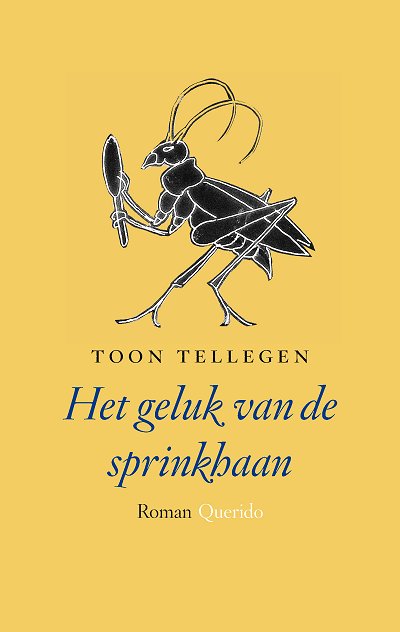
fleursdumal.nl magazine
More in: Archive S-T, The talk of the town, Toon Tellegen
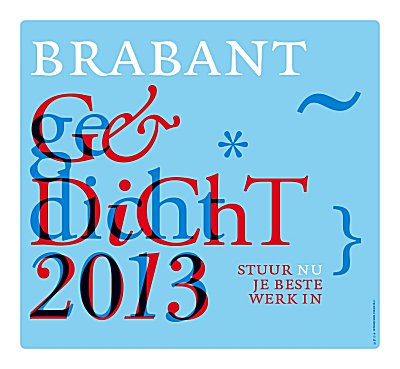
Gedichtenwedstrijd Brabant Gedicht nadert climax
Wie mag zich de beste Brabantse Dichter van 2013 noemen? Op zaterdag 16 maart komen we daar achter tijdens de finale van de internationale gedichtenwedstrijd Brabant Gedicht. In stadsBiEB Centrum betreden acht jonge dichters de poëtische arena tijdens een avondvullende literaire show en declameren hun mooiste poëzie.
Brabant Gedicht is een gedichtenwedstrijd voor jongeren tussen de 16 en 30 jaar, die in (Nederlands of Vlaams) Brabant geboren zijn of er wonen. Tijdens de zinderende finale op 16 maart dragen acht talentvolle dichters uit Nederland en België onder het toeziend oog van een deskundige jury voor uit eigen werk. De uiteindelijke winnaar van Brabant Gedicht 2013 mag zich een jaar lang ‘Beste Brabantse Dichter’ noemen, ontvangt een geldbedrag en is verzekerd van een podiumplaats tijdens het Geen Daden Maar Woorden Festival, dat in mei plaatsvindt in de Verkadefabriek.
Brabant Gedicht is een samenwerking van de bibliotheken in de zustersteden ‘s-Hertogenbosch en Leuven en wordt mede mogelijk gemaakt gemeente ‘s-Hertogenbosch.
Zaterdag 16 maart 2013
stadsBiEB Centrum, Hinthamerstraat 72 te ’s-Hertogenbosch
19.00 – 21.00 uur
toegang gratis
fleursdumal.nl magazine
More in: POETRY ARCHIVE, The talk of the town
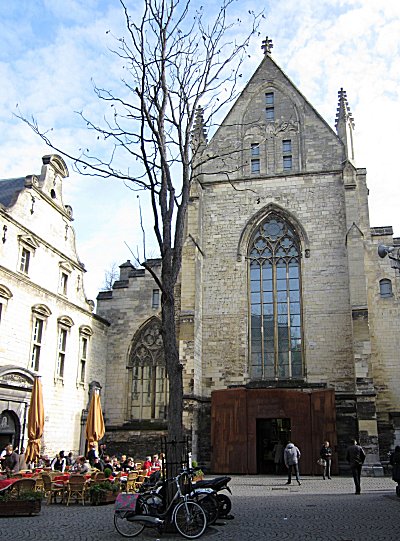
photo fleursdumal magazine
TON VAN REEN
NIEUWE ROMAN DE LICHTVERKOPER
Op donderdag 14 maart wordt de roman DE LICHTVERKOPER van Ton van Reen ten doop gehouden bij Boekhandel Dominicanen/Selexyz in Maastricht.
Maastricht in het jaar 1873. De twaalfjarige Casper Marres woont in de Cité Ouvrière, het mensenpakhuis dat grootindustrieel Petrus Regout voor arbeiders van zijn fabrieken heeft laten bouwen, dicht bij hun werk. Hoewel iedereen in het gezin Marres werkt, komen ze toch nauwelijks rond. De schatrijke Regout en de andere fabrieksdirecteuren worden in hun liberale overtuigingen gesteund door behoudende geestelijken die de arbeiders leren dat de macht wordt geschonken door God en dat de armen de rijken moeten accepteren.
Ton van Reen schreef dit boek om stem te geven aan de mensen die het slachtoffer waren van de hebzucht van de kleine groep industriëlen die kapitalen verdienden over de ruggen van hun arbeiders en hun gezinnen.
DE LICHTVERKOPER verscheen vanaf 1 december tot 16 maart als dagelijks feuilleton in Dagblad De Limburger/Limburgs Dagblad.
Programma:
-Welkomstwoord door locatiemanager Ton Harmes van Dominicanen/Selexyz
-Vraaggesprek over het boek met Ton van Reen door de Maastrichtse schrijfster Emma Crebolder
-Gesprek met Louis Sohl, nazaat van de fotografenfamilie Sohl
-Woord Huub Paulissen, hoofdredacteur van Dagblad De Limburger/Limburgs Dagblad
-Aanbieding eerste boeken door Huub aan Louis Sohl en Ton van Reen
-Ton beantwoordt eventuele vragen uit het publiek en signeert de boeken.
Aanvang: 19.30 uur
Adres: Boekhandel Dominicanen/Selexyz
Dominikanerkerkstraat 1, 6211 CZ Maastricht
Tel: 043-3040130 e: klantenservice.dominicanen@selexyz.nl
Voor vragen aan de uitgever: Pieter Jan Engelen, Manager Oplage Media Groep Limburg: p.engelen@mgl.nl Uitgever: Mooi Limburgs Boekenfonds, onderdeel van Media Groep Limburg
DE LICHTVERKOPER: ISBN 978-90-8596-090-4
In de boekenweek signeert Ton van Reen ook bij Boekhandel Bruna Helden-Panningen (vrijdag 15 maart, van 19.30 tot 21.00 uur), Boekhandel Leeskunst Kerkrade (donderdag 21 maart, van 19.00 tot 21.00 uur) en bij Boekhandel Koops Venlo (zaterdag 23 maart, van 14.00 tot 16.00 uur)
fleursdumal.nl magazine
More in: Reen, Ton van, Ton van Reen

Ton van Reen
DE MOORD XXXIV
DE MARMOT IS DOOD. LEVE DE MARMOT
DE FAMILIE GAAT KAPOT. LEVE DE FAMILIE
Rumoer. Een steen plofte op het dak. Ik keek naar buiten. Schrok. Voor het huis stond een menigte. De mensen riepen: ‘We willen geen schooiers in de Lichtstad Kork,’ en: ‘Houd onze goede stad rein.’
Er leefde haat in de menigte.
De marmot, die nooit bang was geweest voor mensen, liep naar buiten om naar het rumoer te kijken. Een vent gooide een muursteen. Raakte. De marmot gaf een schreeuw. Een gierende uithaal, als van een kind dat begon te huilen. Ik had de marmot nooit gehoord. Hij maakte nooit geluid. Dit was het eerste en laatste geluid dat ik van hem hoorde. Ik holde naar hem toe, nam hem in de armen en huilde met mijn gezicht tegen zijn vacht. Even was de menigte stil. Toen lachte de vent die de steen had gegooid. Het gejoel zwol weer aan.
Ik legde de marmot in de mand. Hij trok van pijn. Nu was hij gestenigd, juist zoals ik had verwacht. Hij had van het bloed van Alice gedronken. Dat was bloedschande. Als de marmot dood was, waren we nog maar met zijn tweeën. Cherubijn en ik. Ik dekte de marmot toe met een deken en bleef bij hem zitten. Hij stierf en werd direct stijf. Hij stierf bescheiden, zoals een marmot hoort te doen. Onze marmot hoefde niet bescheiden te zijn. Tenslotte was hij een volwaardig lid van de familie. Ik maakte een kuil achter het huis, draaide de marmot in een doek en begroef hem.
Met zijn tweeën waren we over. Met een enorme kou in ons hart. Cherubijn bleef naar buiten kijken. Hij dacht na. Wist ik maar wat hij dacht!
Ik liep naar buiten. De menigte was vertrokken. Er liepen militairen door de straat. Ze omsingelden het huis. Ze grepen me.
‘Jou zoeken we,’ zei een officier. ‘Er is een aanklacht tegen je ingediend. Je bent een sadist. We hebben de bewijzen.’
Ze bonden mijn handen op de rug en leidden me naar het huis van de burgemeester. De burgemeester zat in zijn zetel. Uit een papiertje haalde hij de doorgestoken lijkjes van tweeëntwintig mieren.
Het waren de lijkjes van de mieren waarmee ik mijn record verbeterd had in het Woud van Tubbs. Tweeëntwintig mieren had ik laten lopen over een afstand van dertig centimeter elk, in twintig minuten. De burgemeester was er getuige van geweest.
‘Dit is een bewijs van je sadisme,’ zei de burgemeester. Hij stalde de lijkjes uit. Iedereen keek er vol afgrijzen naar.
‘We geven je terug aan Kaïn en Kana,’ zei de burgemeester. ‘Je mag niet meer van hen weglopen en met een houtenpoot op stap gaan. Je mag niet bij schooiers leven.’
Mocht hij Cherubijn houtenpoot noemen omdat hij een houten poot had? Mocht hij Cherubijn schooier noemen?
Kaïn en de Gore Kana kwamen me halen. Blijkbaar waren ze uit de cel ontslagen. Ze namen me ieder bij een hand. Ik voelde me vuil worden. Ik kon niet terug naar Cherubijn. Ik zou bij Kaïn moeten wonen en bij de Gore Kana.
We reden met de bus de Lichtstad Kork uit. Ik schrok toen we over de brug van Kork reden. We passeerden de wagen van Cherubijn.
Cherubijn liep in de burries van het paard. Zijn gezicht was blauw. Aan zijn armen zat bloed. Met elke stap die hij maakte sloeg hij over naar rechts. Hij kon de wagen maar net in beweging houden.
Achter hem liepen lachende militairen die hem in het oog hielden en hem voortdreven.
EINDE
kempis.nl poetry magazine
More in: - De moord
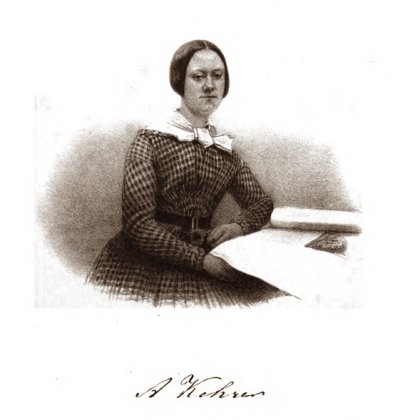
Albertine Kehrer
(1826-1852)
Een zonnestraal
Ik trad het somber klaaghuis in,
Waar de arme weduw treurde,
‘t Verblijf van ‘t vreedzaam huisgezin,
Welks band de dood verscheurde.
Een kostbaar offer vroeg hij daar,
De koning der verschrikking;
Zoo ooit, nu viel het zwijgen zwaar
In ‘t leed van Gods beschikking.
Ook zat ze in sprakeloozen rouw,
Voor de aard geheel verloren,
En smolt in tranen weg, en wou
Der vrienden raad niet hooren.
Het lief en vrolijk daglicht scheen
Haar haatlijk in haar smarte;
‘t Was even donker om haar heen
Als in haar nokkend harte.
Hoe treurig stak dat duister af
Bij ‘t middaglicht daar buiten!
Zij wilde ‘t zóó. Als in een graf
Zou zij zich op gaan sluiten.
Maar door een oopning, klein en naauw,
Een reetjen in de blinden,
Wist toch een lichtstraal zwak en flaauw,
Een doortogt zich te vinden.
En zie, die zachte glans bescheen
‘t Beeld des gedoornenkroonde,
Dat – was het toeval? – dus alleen
Als lichtpunt zich vertoonde.
Of gij het zaagt, bedroefde vrouw,
Met uw benevelde oogen!
Och, waarom houdt gij in uw rouw
Halstarrig ‘t hoofd gebogen?
O gij, wier leed mij ‘t harte breekt,
(‘k Ween met U om den doode!)
Zie op, merk wat dat lichtspel spreekt,
Stomme evangeliebode.
‘Hoe zwart een nacht van rouw daar viel,
Het beste is niet verloren;
Er blijft een lichtpunt voor de ziel
Die Christus mag behooren.
Hij is het zelf, de man van smart,
Oneindig in erbarmen,
Hij, met zijn godlijk liefdehart,
Zijn open broederarmen.
Hij, die de diepste boezempijn
Wil zalven en verzachten,
En ten volkomen trooster zijn
Hun, die Zijn troost verwachten!’
Verfrischt, verkwikt die hemeldauw
U, neêrgebogen lelie?
Of is dat woord – gij antwoordt naauw! –
Is ‘t u geen evangelie?
Is Jezus liefde u niet genoeg,
Hoe fel de wonden bloeden?
Wat God u gaf en wedervroeg,
Kan Hij ‘t u niet vergoeden?
Zoo was uw’ ziel dan iets ter aard
Naast, boven Hem begeerlijk;
Hij, aller hoogste liefde waard,
Niet éénig onontbeerlijk?
Zoo hoorde, schoon des Heilands beeld
Den wand sierde uwer woning,
Uw hart dien Heer niet onverdeeld,
Ja, was een mindre er Koning?
Zoo ‘t waar… Wél diep beklaagbre dan,
Dat gij een troost moet derven,
Die enkel vrede geven kan
In leven en in sterven!
Zoo ‘t waar … Maar ik veroordeel niet
Wie God zoo zwaar beproefde;
En – mooglijk vormt uw zielsverdriet
U tot ‘naar God bedroefde!’
De smart die thans uw borst doorboort,
Uw schreijend oog verduistert,
Wordt haast misschien het liefdekoord
Dat u aan Jezus kluistert.
En dan, als duizenden weleer,
Zult gij ervaren mogen,
Hoe onbeschrijflijk zacht de Heer
De tranen weet te droogen!
Albertine Kehrer poetry
fleursdumal.nl magazine
More in: Albertine Kehrer, Archive K-L, Kehrer, Albertine
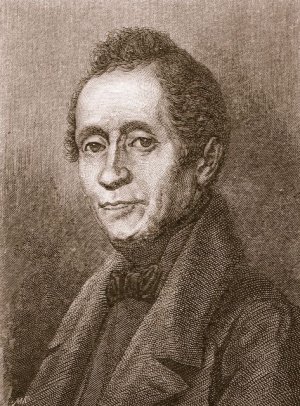
Joseph Freiherr von Eichendorff
(1788-1857)
Der Gefangene
In goldner Morgenstunde,
Weil alles freudig stand,
Da ritt im heitern Grunde
Ein Ritter über Land.
Rings sangen auf das beste
Die Vöglein mannigfalt,
Es schüttelte die Äste
Vor Lust der grüne Wald,
Den Nacken, stolz gebogen,
Klopft er dem Rösselein –
So ist er hingezogen
Tief in den Wald hinein.
Sein Roß hat er getrieben,
Ihn trieb der frische Mut:
»Ist alles fern geblieben,
So ist mir wohl und gut!«
Mit Freuden mußt er sehen
Im Wald ein grüne Au,
Wo Brünnlein kühle gehen,
Von Blumen rot und blau.
Vom Roß ist er gesprungen,
Legt’ sich zum kühlen Bach,
Die Wellen lieblich klungen,
Das ganze Herz zog nach.
So grüne war der Rasen,
Es rauschte Bach und Baum,
Sein Roß tät stille grasen,
Und alles wie ein Traum.
Die Wolken sah er gehen,
Die schifften immer zu,
Er konnt nicht widerstehen, –
Die Augen sanken ihm zu.
Nun hört er Stimmen rinnen,
Als wie der Liebsten Gruß,
Er konnt sich nicht besinnen –
Bis ihn erweckt’ ein Kuß.
Wie prächtig glänzt’ die Aue!
Wie Gold der Quell nun floß,
Und einer süßen Fraue
Lag er im weichen Schoß.
»Herr Ritter! Wollt Ihr wohnen
Bei mir im grünen Haus:
Aus allen Blumenkronen
Wind ich Euch einen Strauß!
Der Wald ringsum wird wachen,
Wie wir beisammen sein,
Der Kuckuck schelmisch lachen,
Und alles fröhlich sein.«
Es bog ihr Angesichte
Auf ihn, den süßen Leib,
Schaut’ mit den Augen lichte
Das wunderschöne Weib.
Sie nahm sein’n Helm herunter,
Löst’ Krause ihm und Bund,
Spielt’ mit den Locken munter,
Küßt’ ihm den roten Mund.
Und spielt’ viel süße Spiele
Wohl in geheimer Lust,
Es flog so kühl und schwüle
Ihm um die offne Brust.
Um ihn nun tät sie schlagen
Die Arme weich und bloß,
Er konnte nichts mehr sagen,
Sie ließ ihn nicht mehr los.
Und diese Au zur Stunde
Ward ein kristallnes Schloß,
Der Bach ein Strom, gewunden
Ringsum, gewaltig floß.
Auf diesem Strome gingen
Viel Schiffe wohl vorbei,
Es konnt ihn keines bringen
Aus böser Zauberei.
Joseph Freiherr von Eichendorff poetry
kempis.nl poetry magazine
More in: Archive E-F
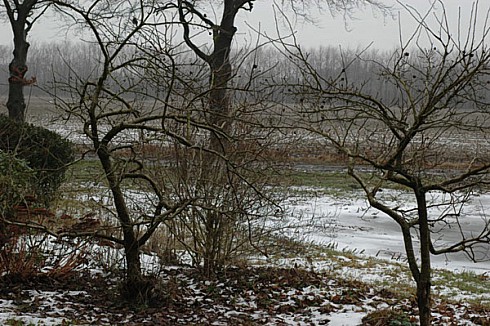
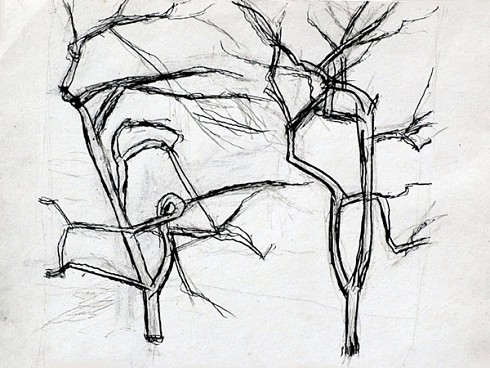
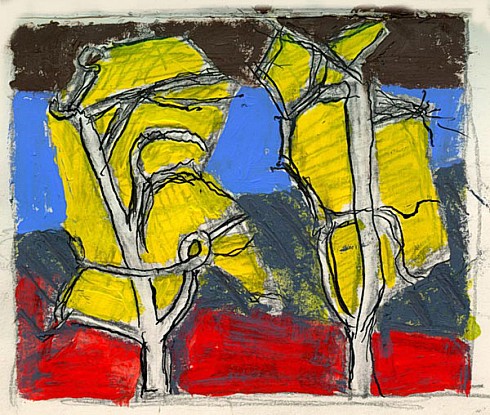
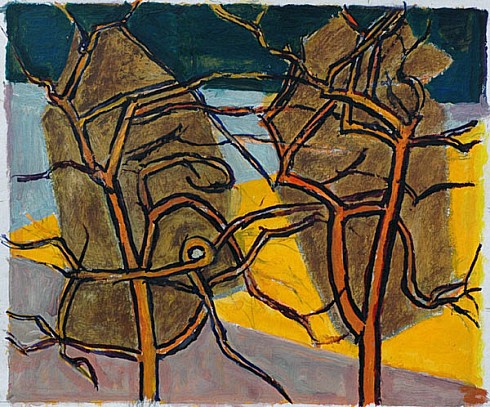
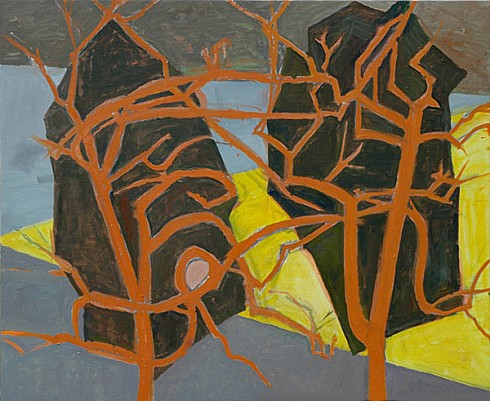
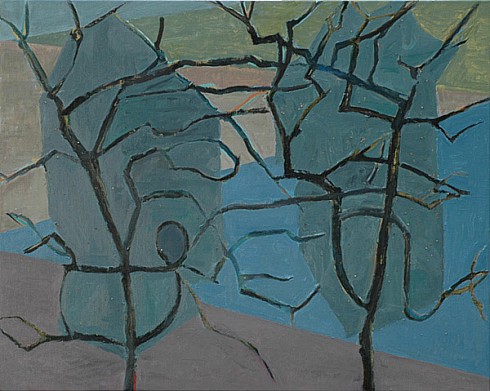
Hans Ebeling Koning. A painter’s process
Hans Ebeling Koning (1931) received his education at AKI in Enschede where he later became a teacher in drawing and painting. His work is represented in many public and private collections including Museum Henriette Polak in Zutphen, Rijksmuseum Twente and the Museum of Modern Art in Arnhem.
Jeanne Oosting Price for Painting 1997: ‘Next to this particular view on the subjects, painting itself plays a major role in the work of Hans Ebeling Koning. Almost never you will find empty virtuosity employed. It seems that something in the works needs to be conquered to form a synthesis of skill and vision.’
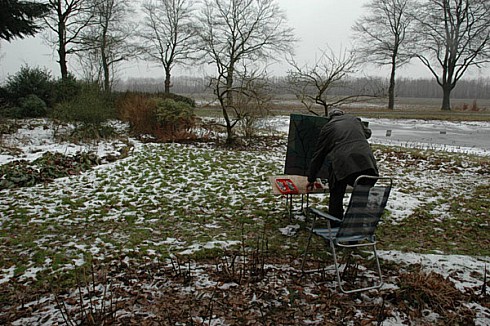
Hans Ebeling Koning. A painter’s process. © H. Ebeling Koning
kempis.nl poetry magazine
More in: Dutch Landscapes, Hans Ebeling Koning
Thank you for reading Fleurs du Mal - magazine for art & literature